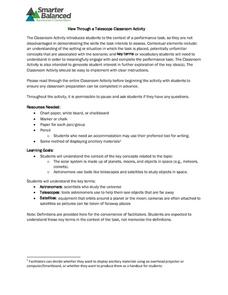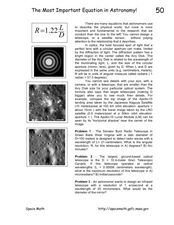Space Awareness
Sun, Earth and Moon Model
The moon orbits Earth while the Earth is rotating, and the Earth revolves around the sun. This can be a tricky concept for young astronomers. Implement an activity that helps distinguish between the movements of Earth's systems around...
PBS
Analyzing Light Curves of Transiting Exoplanets
Scientists detected exoplanets by measuring how the brightness of stars changed over time. Young astronomers interpret and analyze the same data that led to exoplanet discoveries. They learn to apply light curve graphs and connect the...
Princeton University
A Teacher's Guide to the Universe
Astronomers only observe four percent of the universe as the rest hides in darkness. The size, shape, and movement of the universe are the focus for an long-term high school unit. Its 43 lessons include hands-on experiments, direct...
Space Awareness
Meet Our Neighbors: Moon
Since a field trip to the moon isn't possible, bring the moon to young astronomers! Participants use everyday materials to create models of the moon and represent the features on its surface. The materials serve as a tactile as well as a...
Las Cumbres Observatory
Star In a Box (Paper-Based)
Do stars age gracefully? Young astronomers use colored paper and data on luminosity and temperature to model the changes of a star during its lifetime. They then compare models of stars of different mass and radii.
University of Colorado
Using Spectral Data to Explore Saturn and Titan
Saturn is really far away, but knowledge of its composition is within reach. Future astronomers learn how scientists use spectra to remotely determine the chemical composition of a planet or moon. They try out this concept by analyzing...
American Museum of Natural History
Space Jell-O
A tasty treat lends its curious substance to space exploration. Mimicking the discoveries of Albert Einstein, young astronomers beginning by making a batch of Jello-O, then four hours later, scholars place edible objects that act like...
NASA
When Do Lunar Eclipses Happen?
Who needs the daylight to simulate a lunar eclipse? Astronomers model the positions of the Sun, Earth, and Moon to explain the necessary conditions for a lunar eclipse. Investigators cut and label a paper plate to represent the Earth and...
NASA
Evaluating a Lunar Eclipse
Do all lunar eclipses look the same? Find out in an activity where astronomers use the Danjon Scale of Lunar Eclipse Brightness to describe the color and brightness of the moon during an eclipse. Explorers make three observations using...
Smarter Balanced
View Through a Telescope
Preparing for an assessment? Here's an activity that will ensure that all class members have the background knowledge they need to demonstrate their skills on a performance task related to the solar system and the tools astronomers use...
Curated OER
Learning from Light: The Big Bang
Students explore what astronomers are able to examine our galaxy and universe by examining light. They explore in this sub-unit the formation of the universe, commonly called "The Big Bang," and it follows studying from the Light: The...
Curated OER
Astronomical Data
For this astronomy worksheet, students use a chart with planetary data comparing the inner planets to each other. Students will use the period of rotation, period of revolution, and distance from the sun for these inner planets to...
Curated OER
The Solar System
In this solar system activity, students complete a word puzzle by determining the terms associated with the 10 statements about the planets.
Curated OER
Uranus, Neptune, and Pluto
In this planets worksheet, students read information about Uranus, Neptune, and Pluto and then complete 18 multiple choice, 4 true or false, and 2 fill in the blank questions.
Curated OER
The 'Solar' System Past and Present
Students identify cardinal and intermediate directions, recognize that models changes due to new or improved observations and technology, identify the major characteristics of the planets including their positions in the solar system,...
Curated OER
Types of Scientists
For this science worksheet, students match each type of scientist listed in the left-had column to its correct description found in the right-hand column. There are 34 different scientists to match on the sheet.
Curated OER
Stars
In this stars worksheet, students review characteristics of stars and different constellations. This worksheet has 14 vocabulary words placed in a crossword puzzle.
Curated OER
The Most Important Equation in Astronomy!
In this astronomy optics worksheet, students calculate the angular resolution and maximum resolution for given telescope specifics. This worksheet has 3 problems to solve.
Curated OER
Tools of Modern Astronomy
Students describe the electromagnetic spectrum and astronomy. For this astronomy lesson students complete an activity, predict what will happen and complete a worksheet.
Curated OER
Distances to Stars
Students explore the idea of parallax. In this astronomy lesson plan, students study the distances of stars. They investigate how parallax can be used to determine these distances.
Curated OER
The Next Logical Step in Astronomy
Learners research future astronomy endeavors and how the exploration with contribute to astronomy and humanity. In this astronomy lesson plan, students research, present, and debate the topics as a class.
Illinois State Board of Education
Solar System
Aspiring astronomers solve problems involving mixed units of the same attribute, including time, money, length, and area. They convert large numbers into scientific notation, then compute and compare ratios to explain why drawing...
Curated OER
Flip Books!
These aren't exactly worksheets, but rather a selection of pdf files of different atmospheric or solar events. Print your chosen pdf file for each aspiring astronomer in your class, have them cut out the individual mini pages, arrange...
Curated OER
The Electromagnetic Radiation (Light ~ the Supreme Informant!)
This short slide show applies the electromagnetic spectrum to astronomy. First, electromagnetic radiation is introduced to viewers. Wavelength is defined and its unit of measurement explained. Finally, aspiring astronomers find that the...
Other popular searches
- Famous Astronomers
- Early Astronomers
- Major Astronomers
- Ancient Astronomers
- Greek Astronomers
- Report on Astronomers
- Astronomers Measure Distance
- Women Astronomers
- Female Astronomers
- Fumes Astronomers
- Five Early Astronomers
- Famous Astronomers Quizes

























